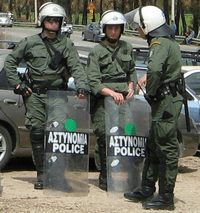A new chapter in Greece's debt crisis began after the EU and the IMF agreed to provide a $145 billion financial aid package to the troubled country. The agreement is conditional on Athens implementing a severe austerity program expected to reduce the public deficit from the current 13.6 percent to less than 3 percent by 2014. Despite the package, the difficulties ahead remain daunting. In order for the bailout to succeed, Prime Minister George Papandreou will have to face a number of challenges that will require all his political skills -- and some luck.
Papandreou's first challenge will be to remain in power. His acceptance of the austerity measures has pleased EU officials and the IMF, but has left large segments of the Greek population angry. Public opposition is mounting rapidly, and riots have already left three dead. Polls show that over 70 percent of Greeks oppose the government seeking help from the IMF. Moreover, 68 percent said they were not prepared to make "sacrifices" -- a huge increase from last month's 30 percent. Nationwide strikes organized by civil servants have already paralyzed the country this week, and more protests are expected to come.
Moreover, the prospect of IMF and EU intervention in the Greek economy has triggered the rise of nationalist sentiment. As a result, the Papandreou administration risks being perceived as controlled by "foreign forces," as one protestor put it. Such a view, if it takes root among the public opinion, could prove lethal to the government's resilience. Careless remarks from European leaders could help ignite these sentiments, even if IMF officials have learned to remain more circumspect.

